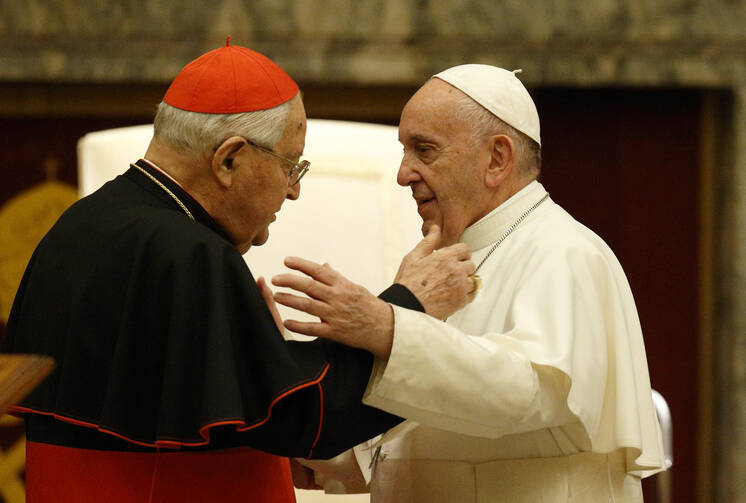After accepting the resignation of 92-year-old Cardinal Angelo Sodano as dean of the College of Cardinals, Pope Francis changed the norms of the office so that the dean would be elected to a five-year term renewable only once.
Cardinal Sodano, the former Vatican secretary of state, was elected dean in April 2005 after Cardinal Joseph Ratzinger, dean under St. John Paul II, was elected Pope Benedict XVI.
In his apostolic letter issued “motu proprio” (on his own accord), Pope Francis said that given the size of the College of Cardinals and the workload being dean entails, he decided it was best for the office to have a defined term of service.
Francis also changed the norms of the office so that the dean would be elected to a five-year term renewable only once.
The letter was released by the Vatican Dec. 21 after Cardinal Sodano performed his last official task as dean by offering Pope Francis Christmas greetings on behalf of the cardinals and top officials of the Roman Curia.
Pope Francis used the occasion to express “my gratitude, including in the name of the members of the College of Cardinals, for the precious and punctual service he [Cardinal Sodano] has offered as dean for many years with availability, dedication, efficiency and a great ability to organize and coordinate.”
“Now it is up to the cardinal bishops to elect a new dean,” the pope said, referring to a group of 12 top-ranking cardinals. “I hope they elect someone who will occupy this very important role full time.”
Members of the College of Cardinals are divided into a three-tier internal hierarchy: cardinal bishops, cardinal priests and cardinal deacons. The cardinal bishops historically were those who had titular dioceses near Rome rather than titular churches inside the city. However, Pope Paul VI added to the group cardinals who are patriarchs of Eastern Catholic churches. In 2018, Pope Francis added four more cardinals: the Vatican secretary of state and the prefects of the congregations for Eastern Churches, Bishops and the Evangelization of Peoples.
Generally, the cardinal priests are cardinals who are diocesan bishops, while cardinal deacons are other cardinals working in the Roman Curia.
Pope Francis reaffirmed the practice that the cardinal bishops elect the dean, who presides over the College of Cardinals and has special duties when a pope dies or resigns.
The dean is charged with officially informing the other cardinals and heads of state that a pope has died; he establishes the date the cardinals will begin their “general congregations” to discuss the current status and needs of the church; and he presides over those meetings before the cardinals enter the conclave to elect a new pope.
If the dean is under the age of 80 and therefore eligible to enter the conclave, he issues the oath of secrecy to the cardinals and determines whether the college is ready to begin the election. He also is the one who asks the person elected if he accepts and what name he wishes to use.
Cardinal Sodano was already over 80 when Pope Benedict resigned, so he was not in the conclave that elected Pope Francis. Those duties were assumed by the sub-dean, Cardinal Giovanni Battista Re.








